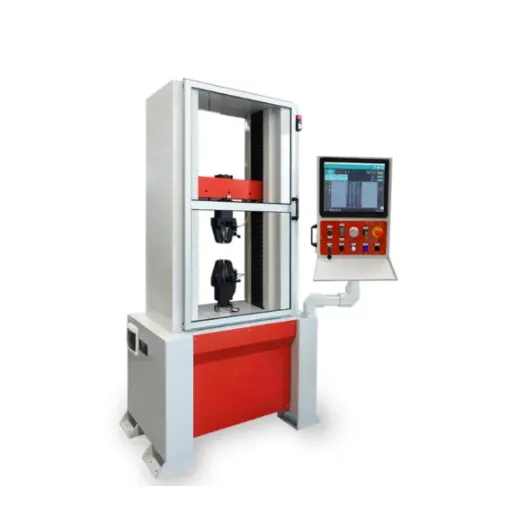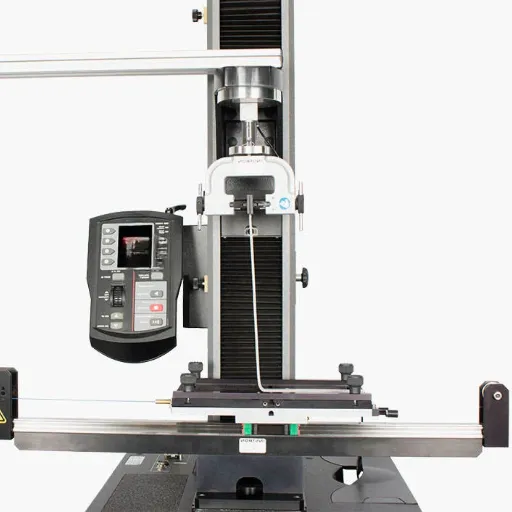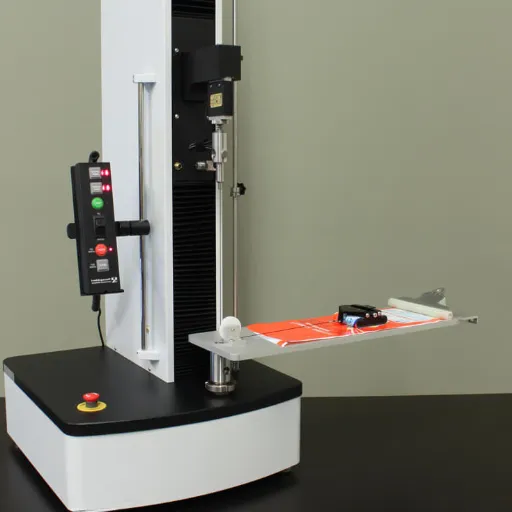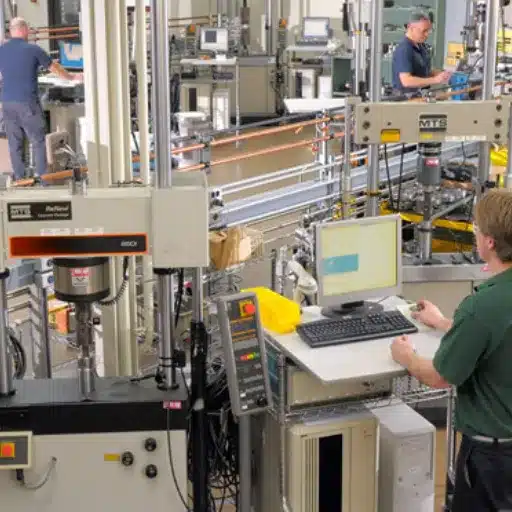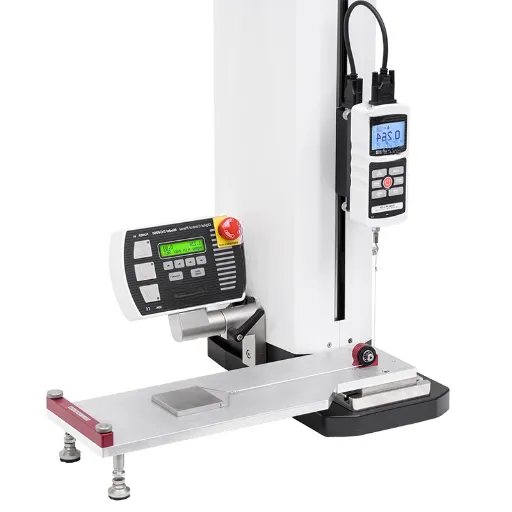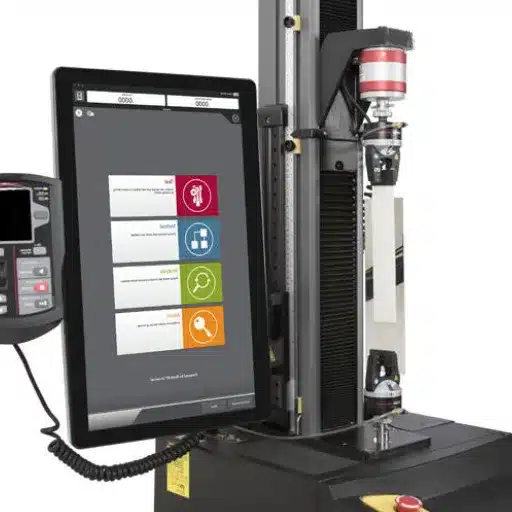In the arena of material science and engineering, tensile testing machines are considered fundamental instruments from a perspective of strength, durability, and elasticity testing. Say you are an expert testing an industrial item for performance; are you an inquisitive student trying to understand stress mechanics? Knowing what a tensile tester is would do much to open countless opportunities in materials. The article dives deeper into the realm of tensile testing machines while trying to shed light on their purpose, working principle, and new advances that have been developed. We walk you right through current studies and applications in real industry and a scientific look into material testing to give you a complete perspective of how tensile testers are helping to change the whole system of material validation and quality control.
Understanding Tensile Testing Machines
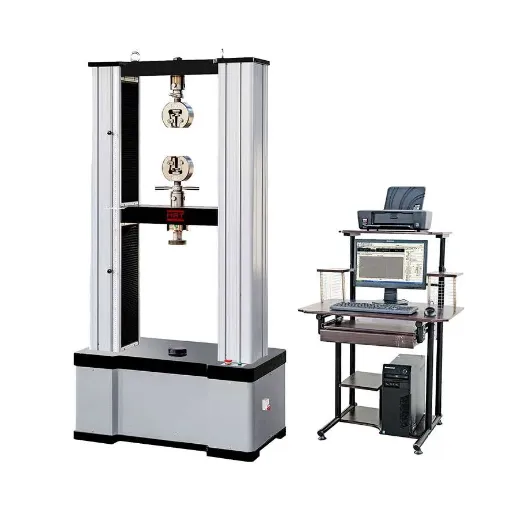
What is a Tensile Testing Machine?
Tensile testing machines are devices that are used to check the mechanical properties of materials under tension. It applies a force with required precision to the material sample, stretches it until deformation begins, or breaks. Such information reveals the tensile strength, elongation, and elasticity-the most vital features to check whether a material will perform as expected in real-life applications.
The testing machine has a frame with a load cell wherein the load applied is converted into an electrical signal proportional to the load exerted, which can be viewed on a display attached to the machine. Then, it has grips or fixtures that grip the material to be tested. Finally, the motorized crosshead begins to move, carrying a set displacement rate in tension. As the specimen is stressed with time, data relating to the material’s behavior is recorded and analyzed, often with stress-strain curves depicting force versus deformation; with these results, an engineer or manufacturer can determine if a material is apt for certain use requirements.
A tensile testing machine is just the kind of equipment one needs in any industrial setup, starting with construction activities and aerospace, where the materials have to be abase of trust. It yields accurate and constant readings that are indispensable in assessing materials, supporting quality control, product development, and research. By the knowledge of characteristics of the material through tensile testing, innovator can design safer, stronger, and more useful products.
Types of Tensile Testing Machines
Tensile testing machines serve the vital purpose of testing material properties under tensile loading. These machines can be divided into the following three principal types in terms of their operation and functionality:
Universal Testing Machines (UTM)
These are the most versatile tensile testing machines. Metals and plastics, for example, are among the materials that can be tested. Other tests such as compression and bending may be done with the same device. This flexibility allows general-purpose testing of materials.
Single Column Testing Machines
Small tensile testing machines for low-strength materials are in use. These are sometimes used where space is limited or lower force tests are being conducted. Though small, a single column testing machine can be depended upon for accurate results.
Dual Column Testing Machine
For testing materials of higher strength, such machines are more stable and have higher load capacity. They are suitable for applications in industries where testing is done on heavy materials such as metals and composites because they allow great elongation or deformation.
A tensile testing machine is designed for specialized applications to guarantee precision and reliability of the material under special conditions. Depending on the material properties, test requirements, and industry standards, the machine is chosen.
Key Components of a Tensile Test Machine
Several components are considered to be truly fundamental for any tensile testing machine: they work in unison to test materials accurately and reliably. The main component in the system is the load frame which provides structural support for the testing process; the application of the test involves the frame with two major columns or beams to hold the sample securely during testing.
| Component | Function |
|---|---|
| Load Frame | Provides structural support for the testing process with two major columns or beams |
| Load Cell | Measures the force exerted on the material with high accuracy |
| Extensometer | Measures elongation and deformation of the specimen under tensile stress |
| Control System | Enables operation and monitoring of the test process smoothly |
And finally, this is where the control and data acquisition system works to enable operation and monitoring of the test process smoothly. The operator may set parameters, control the machine, and acquire important data during testing. The entire ensemble of systems and components assures that tensile testing machines can consistently and reliably perform in varied industrial and research applications.
Applications of Tensile Testing Machines
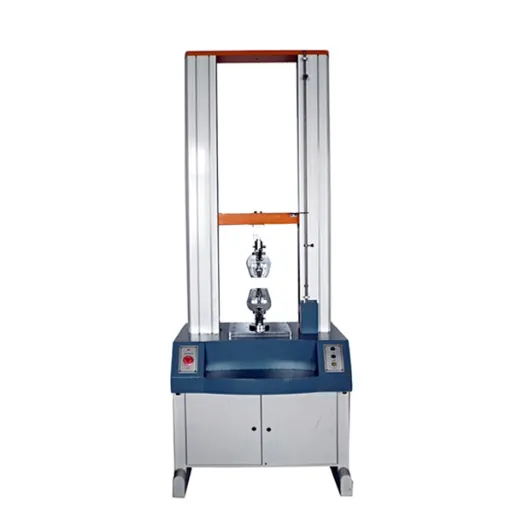
Tensile Testing in Manufacturing
Tensile testing thus occupies a middle ground in manufacturing, making sure that materials perform above certain standards of performance. Different materials ranging from metals to plastics and textiles are tested for their strength, elasticity, and endurance before being incorporated into a product. Understanding how materials would respond under tensile forces allows manufacturers to guarantee that the product is of high quality, safe, and compliant with industry regulations.
The process also identifies the best materials for a given application. For instance, the automotive and aerospace industries demand materials that will possess sufficient strength when placed under stress and strain. With the use of tensile testing, the manufacturers are able to ascertain if their materials meet such requirements: that is, to be able to withstand those stresses and continue performing under working conditions.
Furthermore, tensile testing supports ongoing product improvement. After testing prototypes or samples, manufacturers find potential weaknesses and then address those in their design. Hence, this practice improves product performance and hopefully curtails cost and material wastage. In general, tensile testing across industries plays an important role in quality assurance and production enhancement.
Material Testing in Research and Development
The tensile testing machine is a vital instrument in research and development for studying the mechanical properties of materials. It essentially provides the horizontal stresses experienced by the specimen, thereby measuring attributes critical to the material such as tensile strength, elongation, and yield strength. These devices ensure that materials created meet certain working conditions by giving consistent data for research purposes.
Replicating Real Conditions
When they subject materials to the stresses they would encounter in use, researchers can find their point of failure and adjust the formulation accordingly.
Innovation Support
These new materials will be strong and efficient for their use, with innovation in aerospace, construction, and automotive fields being realized.
Sustainability
By testing materials and their behavior, waste can be minimized, and alternatives explored that use fewer resources to manufacture.
Tensile testing machines contribute to sustainability in material development. By testing materials and their behavior, waste can be minimized, and alternatives explored that use fewer resources to manufacture or have better durability. These are in line with governing environmental considerations and offer cheap solutions to manufacturers. Thus, such machines for tensile testing are really useful in the advancement of material science and in helping create better and more corrosion-resistant products.
Construction Industry Uses
Tensile testing machines are necessary in the construction industry to test the strength and durability of a material intended for use in a construction project. These machines are intended to check the tensile behavior of materials such as steel, concrete, and composites. They enable builders and engineers to be sure that the materials chosen have the strength underlay to carry out safety and performance criteria for different structural applications.
- Load-Bearing Capacity: Tensile testing in construction is one of the means for identifying the load-bearing capacity of materials, ensuring structures can withstand forces without damage.
- Structural Design: The output of tensile testing allows structural design calculations to be made accurately, thus helping to improve the reliability and safety of construction projects.
- Natural Disaster Resistance: This is particularly pertinent in natural disasters prone areas where a material must survive under extreme conditions of either an earthquake or a high wind.
- Cost Efficiency: Proper assessment of materials’ properties can avoid unnecessary overuse of materials, thus generating less waste and reducing costs.
Factors Influencing Tensile Testing Machine Price
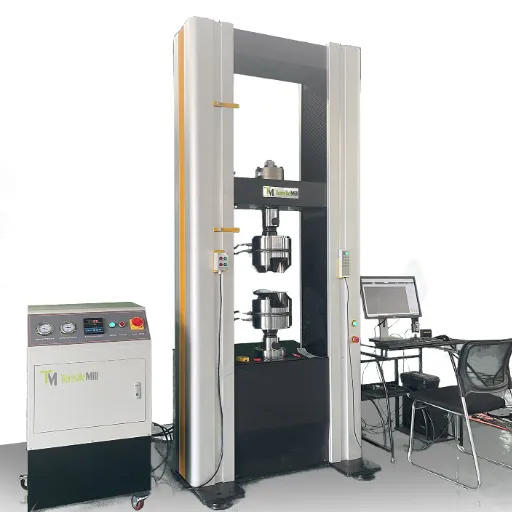
Brand Reputation and Machine Quality
The reputation of a brand generally influences the cost of a tensile testing machine. Established brands that have for years manufactured well-working instruments tend to charge more because of the quality they guarantee. A trust that has grown over the years due to consistent performance under strict test conditions and following industry standards. When customers buy a tensile testing machine, they generally associate an esteemed brand with precision, durability, and good after-sales services-the premium cost is indeed justified for these reasons.
Another major contributor towards price is machine quality. High-quality machines will usually feature strong materials and advanced technology to ensure accuracy and repeatability during the testing process. Factors such as load capacity, resolution, and sophisticated options like digital interfacing or software integration may contribute towards the final price. However, when machines are to be used for more specialized or even high-stake applications, the quality assurance procedure will generally be much tighter, thus raising the costs.
In other words, given adequate funding, it is always worthwhile investing in a machine that guarantees reliability and long life. Knowing your testing requirements will assist find the delicate balance between cost and quality. Preferably, machines that meet your requirements in terms of functionality, accuracy, and support should be given priority so that you may be guaranteed of their performance without breaking the bank.
Advanced Features and Technology
With the influx of new technology in developing tensile testing machines, many good subtleties of advance in utility, precision, and efficiency could be conferred. In these, a high-speed data acquisition system is paramount that acquires data with the fastest repeatability and so can measure force, elongation, and many other important parameters quickly and accurately. During testing, these systems can capture even the tiniest of variations with precision, thereby providing reliable data evidence that are industry standard.
User-Friendly Software
Easy-to-use software interfaces equipped with tutorials for operators to set up tests, automate testing, generate reports, and customize test procedures for specific needs.
Remote Monitoring
Remote monitoring has been incorporated in many systems, thus enabling tests almost to be governed under flexible conditions without being at the testing site.
Multi-Purpose Testing
Advanced tensile testing machines are capable of conducting compression, bending shear testing, and tensile testing, making them multipurpose instruments.
Machine Capacity and Specifications
In common practice, tensile testing machines are equipped to support a wide variety of material tests according to their load capacity and specifications. These machines come with different load capacities, depending on the model and application, from a few Newtons up to hundreds of kilonewtons. It is of essence that the load capacity tests the material so that the machine does not measure inaccurately nor become overloaded.
| Specification | Description |
|---|---|
| Load Capacity | From a few Newtons up to hundreds of kilonewtons |
| Precision | High accuracy, often within less than a fraction of a percent |
| Crosshead Speed | Variable to fulfill properties of given materials during testing |
| User Interface | Graphic interfaces with software for data analysis and reporting |
Furthermore, tensile testing machines often will come with graphic user interfaces and software for data analysis and reporting, allowing the operator to specify test parameters, observe performance in real time, and simply prepare detailed reports. These specs will provide for smooth working, upgrading overall productivity, as well as the whole reliability factor to the testing process of materials, giving these tensile testing machines an utmost reliance in the sectors of manufacturing, construction, and research.
Real-World Examples of Tensile Testing
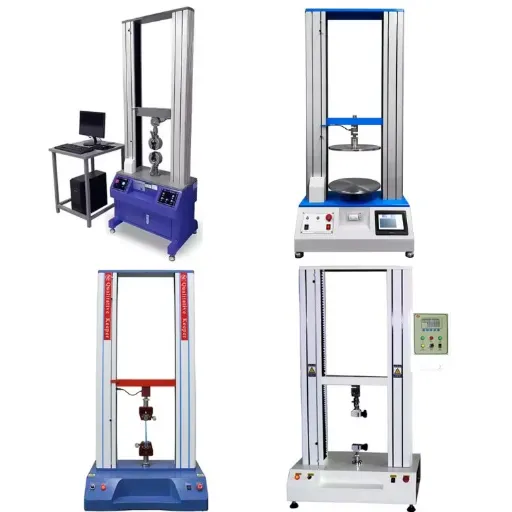
Case Studies in Material Science
Automotive Industry Applications
Tensile testing machines have become indispensable in the automotive sector for analyzing the materials used. Manufacturers test components like steel beams, aluminum alloys, and composite materials to ascertain that safety and durability criteria are met. For one, tensile tests elucidate how these materials would perform during conditions of stress in collisions or in load-bearing situations. Such insights are vital for enhancing vehicle designs and making sure that safety regulations are adhered to.
Construction Industry Insights
The construction industry uses tensile testing to establish strength and reliability of materials like concrete, steel, and reinforced polymers. For instance, knowing the tensile strength of steel rebars allows an engineer to see if it is fit for use in an environment that is subjected to very high stress-a load that has the consideration of a bridge or skyscraper. Similarly, tensile testing for concrete aims at seeing if it will resist strain and crack under heavy load more or less contributing to structural integrity.
Innovations in Aerospace Materials
In the aerospace sector, tensile testing machines are needed to test and analyze lightweight, high-performance materials such as titanium alloys and carbon fiber composites. These materials must meet stringent requirements for their strength-to-weight ratios, both to conserve fuel and to protect human life. By subjecting these materials to tensile testing, they basically tell engineers how their materials hold up or become deformed under various stress conditions so that aircraft components can be designed to be durable yet light and thus serve as a mechanism of further aerospace innovation.
Quality Control in Production Lines
In tensile testing, machines were applied mainly for quality control in production lines wherein the strength and durability of materials were vital. These machines serve to measure tensile properties of strength, elastic properties, or elongation of materials in the consideration of different stress conditions. Such testing, for example, helps to identify materials that are defective or substand-below during production and, thus, helps provide consistency and safety to the end product.
First, the material sample undergoes clamping between two grips where a specific load is applied until deformation or just prior to failure of the specimen. The machine collects all information that includes the maximum load applied, elongation at break, stress-strain behavior, etc., which can be tempted by engineers to check if materials conform to a particular specification or standard necessary to withstand the operational demands of its intended use. In production, the automated tensile testing machine speeds up even further with instant and accurate results, thus making the manufacturing more efficient.
Incorporating tensile testing into production line quality control minimizes the failure risks in finished products, hence saving costs on recalls or liabilities. It guarantees that only materials that meet strength and durability requirements are allowed during manufacturing, thereby ensuring product reliability and customer satisfaction. Through integrating tensile testing machines into the production workflow, industries can maintain stringent quality standards and engage in continuous improvements to their production methods.
Innovations in Tensile Testing Equipment
These days, new gens of tensile testing machines have evolved to provide increased precision, efficiency, and versatility in material testing. Modern technological improvements, such as digital load cells and high-resolution sensors, have made the measurements of force and elongation much more accurate than before. This, on the other hand, gives the manufacturers an exhaustive insight into material performance and hence allows them to design and manufacture better products. There are also automated systems that streamline the testing process by limiting manual intervention and human error so that tests can be consistently repeated.
- Advanced Software Integration: Modern software is replete with a range of features such as real-time data analysis, adjustment of test parameters instantly, and automatic reporting.
- User-Friendly Interfaces: Greater software UI improvements have also put these machines in the reach of less-skilled operators, lowering their training requirements.
- Environmental Adaptability: New tensile testing machines are used to simulate extreme environmental conditions-varying temperatures or varying humidity, for example, to study the behavior of a material under the possibilities presented by such conditions.
Environmental adaptability has been yet another field of innovation here. This versatility ensures product safety and performance standards regardless of whether an adaptation is made to the intended use. This clearly shows how tensile testing equipment has been following the path of advancements in modern industrial trend, enabling industries to ascertain the quality, reliability, and conformity of their products.
Purchasing and Maintaining a Tensile Testing Machine
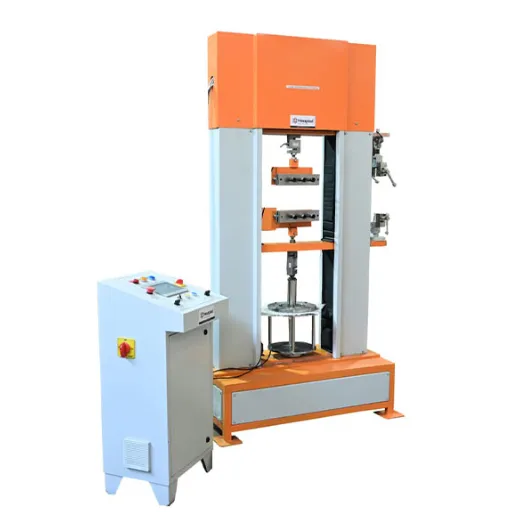
Considerations for Buying Used Tensile Testing Machines
Buying a used tensile testing machine requires a special emphasis on the condition and capability of the equipment. Begin with an inspection of the key mechanical components for any wear or damage, corrosion, cracks, or misalignment. The frame, grips, and load cell need to be intact and in good working condition. Also, make sure that the hardware and software systems of the machine work perfectly and carry out the tests with exact precision.
Calibration Check
Used tensile testing machines must be properly calibrated for the actual tensile testing purpose. Prior to buying the machine, check the records for an existing calibration period, or alternatively have it calibrated by a registered technician.
Support & Parts
Verify the availability of support and spare parts. Certain older types may not have repairable parts or technical support that is easily obtainable, thus making maintenance and repairs difficult to manage.
Software Compatibility
Ask if spare parts are still readily available and if the software can still run on present-day computer platforms to ensure continued functionality.
Handling such considerations will go a long way toward helping you in making a smart purchase of a used tensile testing machine that assures reliability and worth while investment.
Maintenance Tips for Longevity
To maintain the tensile testing machine for a longer life, maintenance must be properly done. Start with whatever maintenance schedules the machine’s manufacturer has recommended. Such schedules are very important because they provide for cleaning, lubrication, and calibration. This step of maintenance keeps wear and tear to a minimum while allowing the machine to function well for long periods.
Check regularly to find evidences of physical damage, or even to detect excessive wear and tear. Since persons and parts are tested under considerable forces, attention must be paid to the load cells, grips, and fixtures. In case of any damage on any of the parts involved, make sure that it is repaired or replaced sooner rather than later before complications arise that may interfere with its performance and safety.
Lastly, keep the machine clean and well-controlled. Do not expose it to excessive dust, moisture, or temperature variations as such conditions will shorten accuracy and functional ability. By having a proactive vision of maintenance, you will have longer look days for a tensile testing machine for good reliability.
Evaluating the Price of a Tensile Tester
The tensile testing machine’s cost is governed by a number of factors, the major ones being its capacity, functionalities, and application scope. Smaller, entry-level models for basic testing tend to be cheaper and therefore find more use in routine lab work or occasional testing. Those with higher load capacities and specialized fixtures for more advanced testing will usually set one back more.
| Machine Type | Cost Factor | Best For |
|---|---|---|
| Entry-Level Manual | Lower Cost | Routine lab work, occasional testing |
| Advanced Automated | Higher Upfront Cost | Time savings, reduced human error |
| High-Capacity Specialized | Premium Pricing | Complex, heavy-duty testing applications |
Ultimately, the investment in the tensiometer should match your specific needs and frequency of the tests. Lower-priced versions may suffice when the tests are basic or rare, whereas industries demanding complex and heavy testing may want to consider long-term benefits of an advanced system investment. Detailed evaluation of your needs ensures that you will get the best value for your investment in the equipment.
Frequently Asked Questions (FAQ)
Q: What is the average tensile testing machine price?
A: The average price of the tensile testing machine varies widely with specifications and features and generally ranges from a few thousand to tens of thousands of dollars. Price depends on load capacity, precision, and whether a machine is used or new.
Q: What are the primary uses of a tensile testing machine?
A: A tensile test machine is essentially employed to determine the tensile strength of materials. It assesses how much a material can endure pulling forces, a vital factor in manufacturing and construction materials for quality control.
Q: What kinds of materials can a machine for tensile testing test?
A: A tensile test machine may test various materials from metals to plastics and composites. Material testing in industries like aerospace, automotive, and construction would be impossible without these machines.
Q: How does a tensile tester function?
A: A tensile tester works by applying a controlled force to a sample until it deforms or ruptures. The machines record the force applied on the specimen and its elongation to yield the tensile strength and the modulus of elasticity.
Q: What role does a tensile testing machine play in quality control?
A: The tensile strength testing machine is an essential equipment in quality control because it guarantees that materials do meet demanded strength requirements. Thus, anything that may lead to failures in the final product is prevented, and compliance with industry standards is assured.
Q: Is there a variety of tensile testing machines?
A: Different types of tensile testing machines do exist, including universal tensile testing machines that perform tensile and compression tests. Further, they are divided by the maximum load capacity, for example, 5kN, 25 kN, or 50 kN.
Q: Is it possible to purchase second-hand tensile testers and if so, what should one consider?
A: It is always cheaper to buy used tensile testing equipment if one wants to be economical. However, the condition of the device and whether it has recently been calibrated or still under warranty need to be considered. Also, it’s important that you may want to do certain tests not entirely in conformity with the equipment.
Q: How can I ensure I am purchasing the right tensile test machine?
A: Consider what testing requirements you want to meet and whether you require a precision instrument. Also, consider any price constraints from your budget. Manufacturer or supplier consultation may enable you to learn about some possible options.
References
-
WTS Machinery – Ultimate Guide to Tensile Testing Machine Prices in 2025
A detailed guide on the price range of tensile testing machines, including standard and advanced features. -
LabX – Buy Tensile Testers, New & Used Prices
A marketplace for new and used tensile testers, offering a variety of options to meet different needs. -
Wikipedia – Tensile Testing
An overview of tensile testing, including the uses and functionality of universal testing machines.

